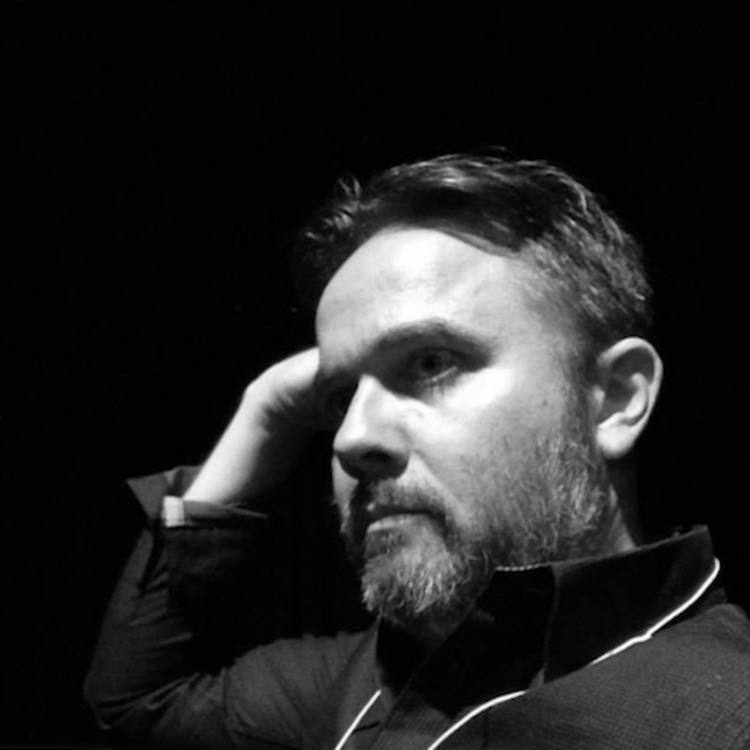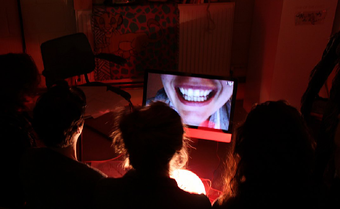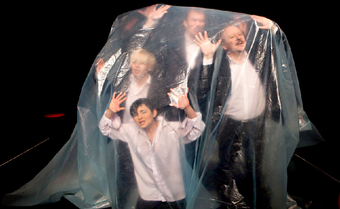Belarus Free Theatre
Threats and Open Conversations
This six-part series explores how the work of Belarus Free Theatre changed an American expatriate's life, inspiring him to find new ways to use theater, writing, and social activism.
The director listened to a message on his cell phone, laughed, and then started passing it around to his actors backstage. “The KGB have just given me a death threat,” he said.
Extraordinarily, the actors laughed along with him. Unfortunately, such a threat was not an unusual occurrence, as over the last few years they had become habituated to intimidation by the secret police for doing theater.
For Nicolai Khalezin, director of Belarus Free Theatre, doing a play inherently involves an element of risk, a very real sense of danger. Since founding the company nine years ago in Minsk, the capital city of Belarus, with his wife Natalya Koliada, the company has had its set pieces and props confiscated; their actors arrested; they and their loved ones have been fired from their jobs. Where do you or your theater file a complaint when the perpetrators of these offenses are the government and law enforcement officials? They have endured tremendous and immediate hardship, because they create theater in defiance of the state.
Meanwhile, outside of Belarus, the group's raw theatrical work has garnered critical acclaim from international audiences throughout Europe and the United States. Their ceaseless courage to continue performing despite their government's severe censorship has earned them the admiration of human rights groups. Theater luminaries including Tom Stoppard and the late Vaclav Havel and Harold Pinter have given their support as well as voiced their outrage.
I was backstage with Koliada and the other members of the company in Norway when Khalezin received his call from the KGB (the fact that Belarus has not bothered to alter this moniker of the country’s intelligence agency after the collapse of the Soviet Union in 1991 is telling). In September 2010, Belarus Free Theatre presented Discover Love at Det Norske Teatret in Oslo, as part of an event organized by the Norwegian Helsinki Committee and my own independent group, Ensemble Free Theater Norway. An original drama directed by Khalezin, the play is based on the true story of Irina and Anatoly Krasovskaya. In 1999, Anatoly called home to say that he would be coming home late, after enjoying a sauna with a friend. Irina never saw her husband again. His car was later discovered, but the bodies of Anatoly and his friend Viktar Hanchar (a prominent critic of the current regime) have never been found. Sinister stories like these are horribly prevalent in Belarus: men and women who “disappear,” usually for criticizing Alexander Lukashenko, the country´s President since 1994.
Often referred to as the “last dictatorship in Europe” by the international media, present-day Belarus is both oppressive and surreal. Censorship permeates all state-run news organizations, and political activity on college campuses is illegal. Anyone publicly opposed to the Belarusian leader—from peaceful protesters to politicians—are intimidated, jailed, even tortured and killed. Belarus remains the only country in Europe to still have the death penalty. Meanwhile, Lukashenko´s motorcade regularly travels down Lenin Street to the Sports Palace, so that he can satisfy his love of hockey. Not surprisingly, Kolkhoznik’s team always wins—Kolkhoznik literally meaning “peasant,” a nickname for the Belarusian President that refers to his pre-political life as a farmer.
While the state aims to portray Belarus as a kind of socialist utopia, independent artists and writers like those in Belarus Free Theatre give voice to stories and subjects considered taboo and unsavory by Lukashenko: the country's rising drug addiction, or its exceptionally high suicide rate (currently ranking sixth in the world). Yet Khalezin abhors calling his work “political theater.” Instead, Belarus Free Theatre hopes to create something, perhaps, even more threatening among Belarusian citizens: an open conversation about what is really happening in their country today.
After their successful performance at Det Norske, the members of Belarus Free Theatre returned home. Three months later, on 19 December 2010, thousands of peaceful demonstrators gathered in Minsk's Independence Square to protest the rigged reelection of Lukahsenko. Journalists, politicians, teachers, students, filmmakers, writers, and artists were arrested—including Koliada. She and Khalezin have been living in exile in the United Kingdom with other members of Belarus Free Theatre ever since.
These personal experiences of Belarus Free Theatre—what they have endured, and what they are willing to sacrifice for what they believe in—humbles me. I cannot imagine being arrested for doing theater, much less being physically threatened by my own government for a play I wrote or acted in or directed. Would I be able to be as brave as Khalezin and Koliada or the other members of their company?
As a theater artist working primarily in Scandinavia and North America, conversations amongst my professional peers tend to focus on economics, such as the recent closing of San Jose Repertory, or renegotiating the professional contracts for members of the Norwegian Actors Union. Playwrights and actors in Oslo or San Francisco don't fear being arrested for presenting an upcoming play, or receive death threats. We take our freedom for granted.
Since getting to know Koliada, Khalezin, and the members of Belarus Free Theatre four years ago, their example has become both a personal inspiration as well as an artistic challenge. Is there a way to avoid taking my freedom for granted, to become more conscious as a citizen and as a theater artist? Can I act to increase awareness of people and places where freedom is restricted, such as Belarus? Is there a way that I can create some kind of “open conversation” of my own for my friends and colleagues in Belarus through my theater practice?
This multi-part series will attempt to articulate how I have attempted to wrestle with these questions over the past few years through my creation of the Belarusian Dream Theater Project.





Comments
The article is just the start of the conversation—we want to know what you think about this subject, too! HowlRound is a space for knowledge-sharing, and we welcome spirited, thoughtful, and on-topic dialogue. Find our full comments policy here
What a nightmare of a story. Here we think of theater as entrée into fame and wealth on a red carpet.